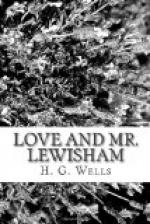She was going to cry!
It set Lewisham marvelling—this totally inappropriate emotion.
He followed her and stood by her. Why cry? He hoped no one would come into the little gallery until her handkerchief was put away. Nevertheless he felt vaguely flattered. She controlled herself, dashed her tears away, and smiled bravely at him with reddened eyes. “I’m sorry,” she said, gulping.
“I am so glad,” she explained.
“But we will fight together. We two. I can help you. I know I can help you. And there is such Work to be done in the world!”
“You are very good to help me,” said Lewisham, quoting a phrase from what he had intended to say before he found out that he had a hold upon her emotions.
“No!
“Has it ever occurred to you,” she said abruptly, “how little a woman can do alone in the world?”
“Or a man,” he answered after a momentary meditation.
So it was Lewisham enrolled his first ally in the cause of the red tie—of the red tie and of the Greatness that was presently to come. His first ally; for hitherto—save for the indiscretion of his mural inscriptions—he had made a secret of his private ambitions. In that now half-forgotten love affair at Whortley even, he had, in spite of the considerable degree of intimacy attained, said absolutely nothing about his Career.
CHAPTER XI.
MANIFESTATIONS.
Miss Heydinger declined to disbelieve in the spirits of the dead, and this led to controversy in the laboratory over Tea. For the girl students, being in a majority that year, had organised Tea between four o’clock and the advent of the extinguishing policeman at five. And the men students were occasionally invited to Tea. But not more than two of them at a time really participated, because there were only two spare cups after that confounded Simmons broke the third.
Smithers, the square-headed student with the hard grey eyes, argued against the spirits of the dead with positive animosity, while Bletherley, who displayed an orange tie and lank hair in unshorn abundance, was vaguely open-minded, “What is love?” asked Bletherley, “surely that at any rate is immortal!” His remark was considered irrelevant and ignored.
Lewisham, as became the most promising student of the year, weighed the evidence—comprehensively under headings. He dismissed the mediumistic seances as trickery.
“Rot and imposture,” said Smithers loudly, and with an oblique glance to see if his challenge reached its mark. Its mark was a grizzled little old man with a very small face and very big grey eyes, who had been standing listlessly at one of the laboratory windows until the discussion caught him. He wore a brown velvet jacket and was reputed to be enormously rich. His name was Lagune. He was not a regular attendant, but one of those casual outsiders who are admitted to laboratories that are not completely full. He was known to be an ardent spiritualist—it was even said that he had challenged Huxley to a public discussion on materialism, and he came to the biological lectures and worked intermittently, in order, he explained, to fight disbelief with its own weapons. He rose greedily to Smithers’ controversial bait.




